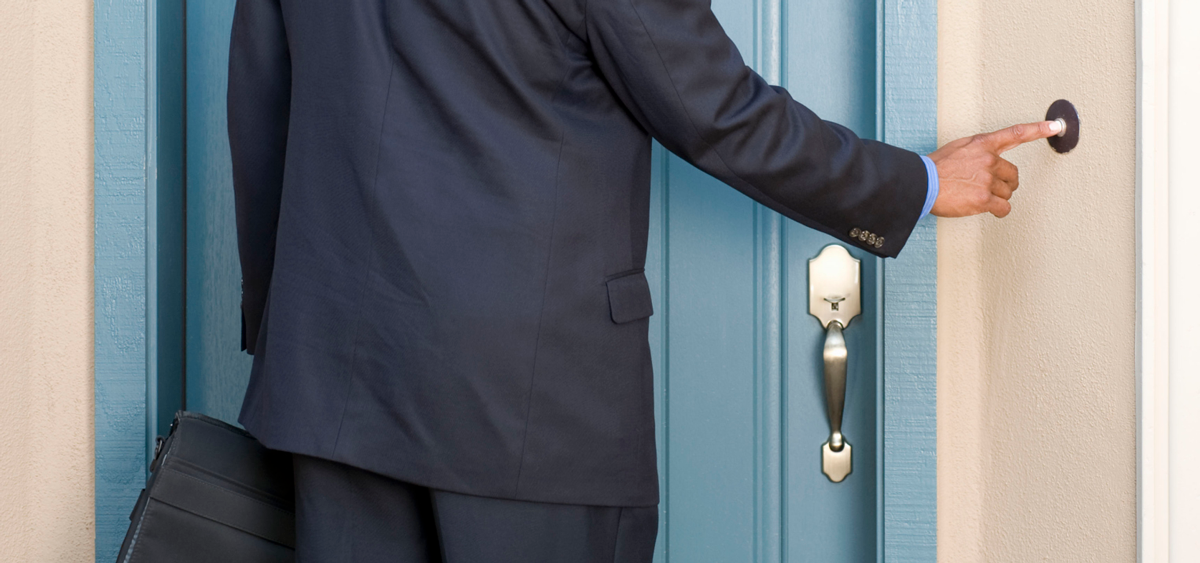You are having supper when the doorbell rings. It’s a young girl selling chocolate. At least it’s not an enthusiastic door-to-door salesperson!
But can anyone sell door-to-door at any time? What are your rights as a consumer?

Permits
Door-to-door salespeople must have a permit issued by:
- the Office de la protection du consommateur (consumer protection office), and
- in many cases, the municipality in which they want to go door-to-door.
You can ask salespeople for their permit numbers verify their validity on the website of the Office if you have any doubts.
Your Child Selling Chocolate: a Door-to-Door Salesperson?
No. Your child who is selling chocolate door-to-door to raise money for school activities (and you, because you’re probably be the one stuck selling the chocolate!) are not covered by the law on door-to-door salespeople. In most cases, municipal by-laws don’t apply to you either. However, your child’s school may need a permit for its students to sell door-to-door.
|
Important! The law doesn’t apply to all door-to-door activities. For example, it does not apply to:
To find out if your municipality considers these people to be door-to-door salespeople, you must check your municipal by-laws. |
Door-to-Door Salespeople “in Disguise“
The law considers certain “ordinary” salespeople to be door-to-door salespeople. This is the case for these people:
- someone who communicates with you to sell you something and then comes to your home afterwards
- door-to-door salespeople who sell their products in fairs or at exhibitions
- all salespeople of doors, windows, roofing, thermal insulation and exterior wall covering
These people must have permits from the Office de la protection du consommateur (consumer protection office). They might also need a permit from municipalities where they want to sell their products.
Buying From Door-to-Door Salespeople
Certain goods cannot be sold door-to-door, including heating or air conditioning units and services like decontamination and insulation.
Door-to-door salespeople must make you written contracts that includes this information:
- their name, address, telephone number and, if applicable, the e-mail address and fax numbers of each of the salesperson’s places of business
- the salesperson’s permit number
- your name, address, phone number and, if applicable, your e-mail address and fax number
- the date the contract was made and the address at which it was signed
- a description of the goods purchased and, if a service was purchased, for how long it was purchased
- the price of each of the goods and services and the applicable taxes
- the total price, including all fees (e.g., delivery costs, handling fees)
- the frequency and date of each delivery or performance of services, the expected date of the last
- the date scheduled for the final delivery or service and, if applicable, information about payment, a description of the goods received as a trade-in or on account, and the agreed price for each item
- the fact that you can cancel the contract within 10 days of the date that you got a copy of the contract
The contract can also be in digital form, but only with your consent.
The salesperson must also attach to your copy of the contract a Statement of consumer cancellation rights and a cancellation form that meets the legal requirements.
The law also gives you the right to cancel your purchase within 10 days of receiving your copy of the contract. Generally, the seller must wait until the end of this period before providing the product or service you bought.
You should know that there are special rules for some kinds of contracts, such as insurance contracts and contracts for pre-arranged funeral services.
What if a Salesperson Breaks the Law?
Door-to-door salespeople who don’t respect the law or municipal by-laws can lose their permits (if they have one) and be fined or receive another sanction.
Also, if the salesperson didn’t follow the law, your cancellation period extends from 10 days to one year!
Preventing Visits from Salespeople
Some municipalities let you to put a sticker on your door or mailbox to indicate that you don’t want door-to-door salespeople.
If salespeople visit you despite your sticker, they can be fined. Check your municipal by-laws to see what they say about this.
Other Types of Door-to-Door Activities
Religious and political groups have the right to knock on your door. Municipal by-laws cannot prevent them. However, these people don’t have the right to harass you.
|
Did you know…? Municipal by-laws often call door-to-door salespeople “peddlers” or “itinerant merchants”. |





